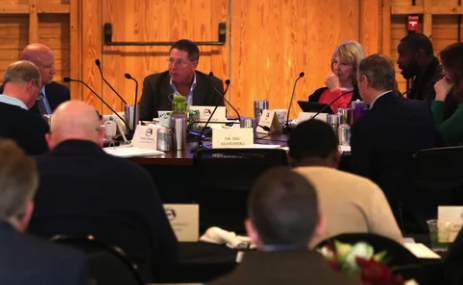Leon County commissioners set new initiatives

By Jeff Berlew
Leon County commissioners reviewed the county’s progress in meeting strategic initiatives and pitched ideas for new ones Monday during their annual retreat at Goodwood Museum & Gardens.
New initiatives approved unanimously by commissioners include finding new ways to engage citizens and boost their input on county activities, reducing the county’s carbon footprint, enhancing prisoner re-entry efforts and helping implement Amendment 4, which restored felon voter rights.
Commissioners also asked administrators to move forward with a number of other suggestions that didn’t quite meet the bar for a strategic initiative. Among them were conducting a holistic assessment of water quality and quantity issues, evaluating ways to improve culture and arts grant funding and offering civics lessons through county libraries and library cards to elementary school students.
The commission’s newest member, Commissioner Rick Minor, offered three strategic initiatives, all of which were approved by commissioners. Among other things, Minor suggested the county do more to get citizen input on everything from the Comprehensive Plan to the county budget.
“We should really take a step back and ask can we do more?” Minor said. “Can we build upon what we’ve already done to engage our citizens even more at some of these key points on where we’re going as a community over the next several years.”
Commissioners added 15 new initiatives to the nearly 60 they already had in place as part of their five-year plan. They also reviewed their progress in meeting a number of bold goals.
The county is more than a third of the way toward reaching its goal of growing the local tourism economy to $5 billion; it’s at $1.8 billion, according to available data. The county is on its way toward surpassing its goal to upgrade or eliminate 500 septic tanks in the primary springs protection zone; some 659 eliminations or upgrades are in progress.
Commissioners also heard a talk by Eric Klinenberg, professor of sociology and director of the Institute for Public Knowledge at New York University. He discussed the role social infrastructure plays in the health and economy of a community, including during disasters like hurricanes.
“It’s really in line with a lot of what we’ve been doing — to look at a library as more than a place where you check out books,” said County Administrator Vince Long. “We’re really creating social ties and social bonds and increasing levels of civic engagement … as well as promoting community resiliency, like serving as a comfort station at the library. It was good to hear from an outside expert in the area about where we might go next.”